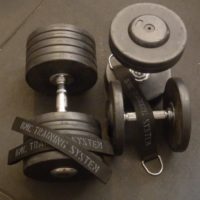Thinking Like a Pro: Smart Gym Moves, Part 2

How can you make your journey to bodybuilding glory as safe as possible? In our last blog post we talked about the importance of warming up, using a spotter when performing potentially risky exercise and the importance of wearing weight belts when your lower back will be receiving a high level of muscular strain. Today’s blog post will cover more ground in terms of establishing your personal safety while you’re working out at home or in the gym. I know for a fact that a large percentage […]
More info





